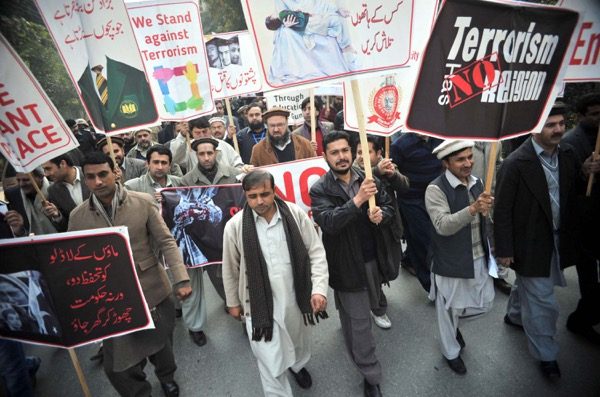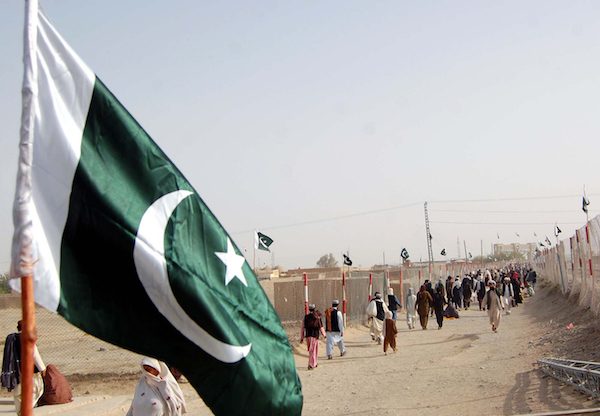In 1974 Zulifaqar Ali Bhutto, Prime Minister of Pakistan, introduced the Second Amendment in the Pakistan Consitution specifically aimed at declaring Ahmadi Muslims as non-Muslims. In 1984 General Zia-Ul-Haq brought in Ordinance XX to the Constitution that effectively made it a crime for Ahmadis to do anything Islamic. We present below the text of the Second Amendment, Ordinance XX and some later introduced minor amendments, all of which deny Ahmadi Muslims the most basic human rights and would form the basis for false accusations of blasphemy against Ahmadis, punishable by imprisonment or even death in some cases.
CONSTITUTION (SECOND AMENDMENT) ACT OF 1974
(DECLARING AHMADI MUSLIMS AS “NON MUSLIMS”)
Vol. XXVI – 1974 Central Statutes 425
ACT XLIX OF 1974
An Act to amend the Constitution of the Islamic Republic of Pakistan
(Gazette of Pakistan, Extraordinary, Part I, 21st September, 1974)
The following Act of Parliament received the assent of the President on the 17th September 1974, and is hereby published for general information:
Where it is expedient to further amend the Constitution of the Islamic Republic of Pakistan for the purposes hereinafter appearing:
It is hereby enacted as follows:
1. Short title and commencement.
(1) This Act may be called the Constitution (Second Amendment) Act, 1974
(2) It shall come into force at once.
2. AMENDMENT OF ARTICLE 106 OF THE CONSTITUTION.
In the Constitution of the Islamic Republic of Pakistan, hereinafter referred to as Constitution, in Article 106, in clause (3), after the word “communities”, the words and brackets “and persons of the Qadiani group or the Lahori group (who call themselves ‘Ahmadis’)” shall be inserted.
3. AMENDMENT OF ARTICLE 260 OF THE CONSTITUTION.
In the Constitution, Article 260, after clause (2), the following new clause shall be added, namely:
“(3) A person who does not believe in the absolute and unqualified finality of the Prophethood of Muhammad (peace be upon him) the last of the Prophets or claims to be a Prophet, in any sense of the word or of any description whatsoever, after Muhammad (peace be upon him), or recognizes such a claimant as a Prophet or a religious reformer, is not a Muslim for the purposes of the Constitution or law.”
Government of Pakistan — Law for Ahmadis
Religious and Ahmadi-specific Laws

EXTRAORDINARY
PUBLISHED BY AUTHORITY
ISLAMABAD, THURSDAY, APRIL 26, 1984
PART 1
Acts, Ordinances, President’s Orders and Regulations including Martial law Orders and Regulations
Government of Pakistan
MINISTRY OF LAW AND PARLIAMENTARY AFFAIRS
(LAW DIVISION)
Islamabad, the 26th April 1984
No. F.17 (1) 84-Pub. The following Ordinance made by the President is hereby published for general information.
ORDINANCE NO. XX OF 1984
AN ORDINANCE
to amend the law to prohibit the Quadiani group, Lahori group and Ahmadis from indulging in anti-Islamic activities:
WHEREAS it is expedient to amend the law to prohibit the Quadiani group, Lahori group and Ahmadis from indulging in anti-Islamic activities:
AND WHEREAS the President is satisfied that circumstances exist which render it necessary to take immediate action:
NOW, THEREFORE, in pursuance of the Proclamation of the fifth day of July, 1977, and in exercise of all powers enabling him in that behalf, the President is pleased to make and promulgate the following Ordinance:
PART I – PRELIMINARY
1. Short title and commencement.
(1) This Ordinance may be called the Anti-Islamic Activities of the Quadiani Group, Lahori Group and Ahmadis (Prohibition and Punishment) Ordinance, 1984.
(2) It shall come into force at once.
2. Ordinance to override orders or decisions of courts.
The provisions of this Ordinance shall have effect notwithstanding any order or decision of any court.
PART II – AMENDMENT OF THE PAKISTAN PENAL CODE
(ACT XLV OF 1860)
3. Addition of new sections 298B and 298C, Act XLV of 1860.
In the Pakistan Penal Code (Act XLV of 1860), in Chapter XV, after section 298A, the following new sections shall be added, namely:
“298B. Misuse of epithets, descriptions and titles, etc., reserved for certain holy personages or places.
(1) Any person of the Quadiani group or the Lahori group (who call themselves ‘Ahmadis’ or by any other name) who by words, either spoken or written, or by visible representation;
(a) refers to, or addresses, any person, other than a Caliph or companion of the Holy Prophet Muhammad (peace be upon him),as ‘Ameerul Mumineen’, ‘Khalifa-tui-Mumineen’, ‘Khalifa-tul-Muslimeen’, ‘Sahaabi’ or ‘Razi Allah Anho’
(b) refers to, or addresses, any person, other than a wife of the Holy Prophet Muhammad (peace be upon him) as ‘Ummul-Mumineen’
(c) (c) refers to, or addresses, any person, other than a member of the family (Ahle-bait) of the Holy Prophet Muhammad (peace be upon him), as ‘Ahle-bait’; or
(d) refers to, or names, or calls, his place of worship as ‘Masjid’; shall be punished with imprisonment of either description for a term which may extend to three years and shall also be liable to fine.
(2) Any person of the Quadiani group or Lahori group (who call themselves Ahmadis or by any other name) who by words, either spoken or written, or by visible representation, refers to the mode or form of call to prayers followed by his faith as ‘Azan’ or recites Azan as used by the Muslims, shall be punished with imprisonment of either description for a term which may extend to three years, and shall also be liable to fine.
(3) 298C. Person of Quadiani group etc., calling himself a Muslim or preaching or propagating his faith.
Any person of the Quadiani group or the Lahori group (who call themselves ‘Ahmadis’ or by any other name), who, directly or indirectly, poses himself as Muslim, or calls, or refers to, his faith as Islam, or preaches or propagates his faith, or invites others to accept his faith, by words, either spoken or written, or by visible representations, or in any manner whatsoever outrages the religious feelings of Muslims, shall be punished with imprisonment of either description for a term which may extend to three years and shall also be liable to fine.”
PART III AMENDMENT OF THE CODE OF CRIMINAL PROCEDURE 1898
(ACT V OF 1898)
4. Amendment of section 99A, Act V of 1898. In the Code of Criminal Procedure, 1898 (Act V of 1898), hereinafter referred to as the said Code, in section 99A, in sub-section (I):
(a) after the words and comma “of that class”, the words, figures, brackets, letter and commas “or any matter of the nature referred to in clause (ii) of sub-section (1) of section 24 of the West Pakistan Press and Publications Ordinance, 1963,” shall be inserted; and
(b) after the figure and letter “295A”, the words, figures and letters “or section 298A or section 298B or section 298C” shall be inserted.
5. Amendment of Schedule II. Act V of 1898. In the said Code, in Schedule II, after the entries relating to section 298A, the following entries shall be inserted, namely:


PART IV AMENDMENT OF THE WEST PAKISTAN PRESS AND PUBLICATIONS ORDINANCE 1963 (W.P. ORDINANCE NO. XXX OF 1963)
6. Amendment of section 24, West Pakistan Ordinance No. XXX of 1963.
In the West Pakistan Press and Publications Ordinance, 1963 (W.P. Ordinance No. XXX of 1963), in section 24, in sub-section (1) after clause (i), the following new clause shall be inserted, namely;
“(ii) are of the nature referred to in section 298A, section 298B. or section 298C of the Pakistan Penal Code (Act XLV of 1860), or”,
General, M. Zia-Ul-Haq,
President.
BLASPHEMY CLAUSES
ACT III OF 1986
CRIMINAL LAW (AMENDMENT) ACT, 198
An Act further to amend the Pakistan Penal Code and the Code of Criminal Procedure, 1898 (Gazette of Pakistan, Extraordinary, part 1, 12th October 1986)
The following Act of Majlis-e-Shoora (Parliament) received the assent of the President on the 5th October, 1986 and is hereby published for general information:
Whereas it is expedient further to amend the Pakistan Penal Code (Act XLV of 1860) and the Code of Criminal Procedure, 1898 (Act V of 1893), for the purposes hereinafter appearing:
It is hereby enacted as follows:
1. Short title and commencement
(1) This Act may be called the Criminal Law (Amendment) Act 1986.
(2) It shall come into force at once.
2. Insertion of new section 295-C, Act XLV of 1860. In the Pakistan Penal Code (Act XLV of 1860), after section 295-B, the following new section shall be inserted, namely:
295-C. Use of derogatory remarks, etc. in respect of the Holy Prophet. Whoever by words, either spoken or written, or by visible representation, or by any imputation, innuendo, or insinuation, directly or indirectly, defiles the sacred name of the Holy Prophet Muhammad (peace be upon him) shall be punished with death, or imprisonment for life, and shall also be liable to fine.”
3. Amendment of Schedule II, Act V of 1898. In the Code of Criminal Procedure, 1898 (Act V of 1898), in Schedule II, after the entries relating to section 295-A, the following new entries shall be inserted, namely:

Since the regime of General Zia-Ul-Haq, Pakistanis have had to fill out a separate column on their passport declaring their ‘religion’ to prevent Ahmadis from travelling to Makkah and for Hajj. In order to have ‘Muslim’ written on a Pakistani Passport a person must declare that Hadhrat Mirza Ghulam Ahmad(as), Founder of the Ahmadiyya Muslim community, was, God forbid an imposter. (Part of this form is reproduced below)





Add Comment